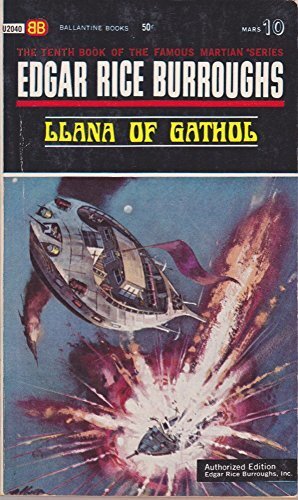In the days leading up to seeing Dune Part 2 one might have thought I’d reread the second half of the book.
Heck no!
Maybe someday I’ll work my way through that epic tome for a second time. I hear the audio version is good. But as I’ve said many times, Dune is no Lord of the Rings and I don’t care to immerse myself in that world very often. If you’ve never read Dune or watched the movies, it’s dense, heavy, stuff layered in meaning designed for parsing out. Herbert doesn’t preach in that first novel, though it was written to do more than simply entertain.
Sometimes, you just want sci-fi that’s fun.
So I went further back in time and read Llana of Gathol, one of Edgar Rice Burroughs’ John Carter stories. Often early science fiction (even the pulpier, American stories) are clumsy by contemporary standards. For example, I’ve read Julian Hawthorn’s The Cosmic Courtship from 1917, and while interesting, it’s more satisfying as an academic curiosity than fun reading. Llana of Gathol, published 24 years later, however, is as entertaining now as it ever was.
Maybe moreso.
After struggling to make ends meet as a rancher, miner, and pencil-sharper salesman, Burroughs decided to try his hand at writing pulp fiction. He figured “...if people were paid for writing rot such as I read in some of those magazines, that I could write stories just as rotten.” In his first story he introduced John Carter, which in my opinion is far from rotten, and the rest is literary history. Tarzan came later, along with many other characters, but the Warlord of Mars remains my favorite.
I think I’ve learned far more visiting Mars than Arrakis.
Both are desert planets with warring factions. But unlike Herbert, Burroughs just can’t take any of it too seriously. Sure Mars is dying and probably won’t be able to sustain life for much longer. But as long as he’s there, John Carter will love the princess Deja Thoris, fight the various Martian armies, and rescue the imperiled. And why not? He’s literally the best at everything.
Aside from being a Confederate war hero, that’s why he’d never get written today.
Some might call him the male equivalent of a Mary Sue, but Burroughs doesn’t write him that way. The fact that he’s basically immortal and never encountered a fight he couldn’t win; that thanks to the lower gravity of Mars he’s a proto-Superman with incredible strength and the ability to leap tall buildings in a single bound, doesn’t mean he’s perfect. Carter sometimes makes tactical and moral missteps, and doesn’t take it for granted that he can’t be killed.
He can’t be everywhere at once, and worries about his loved ones when they're apart.
There’s also the fact that Burroughs declined to write a backstory for Carter, who has no childhood memories. He simply is as he ever was, perpetually in his 30s and a skilled fighting man. Today every character gets an origin story, usually with some traumatic event, that gives him a reason for acting the way he does. Not so here. And frankly, I neither need nor want one for John Carter.
So what have I learned?
Even the most overpowered character can maintain a sense of mystery and be interesting if he’s a man of action in an exotic land. Romantic desire (both for a woman and adventure) satisfies the soul, and the limitations of time and space can offer just enough conflict. While I probably won’t attempt writing a character like him for today’s market, I appreciate this example of heroic fiction in its purest form and will be sure to draw from it.
In other news…
John Carter may be making a return to popular culture. Disney gave up the movie rights after the (most excellent) film bombed, but JohnCarterIsComing.com suggests we haven’t seen the last of the immortal hero.

























